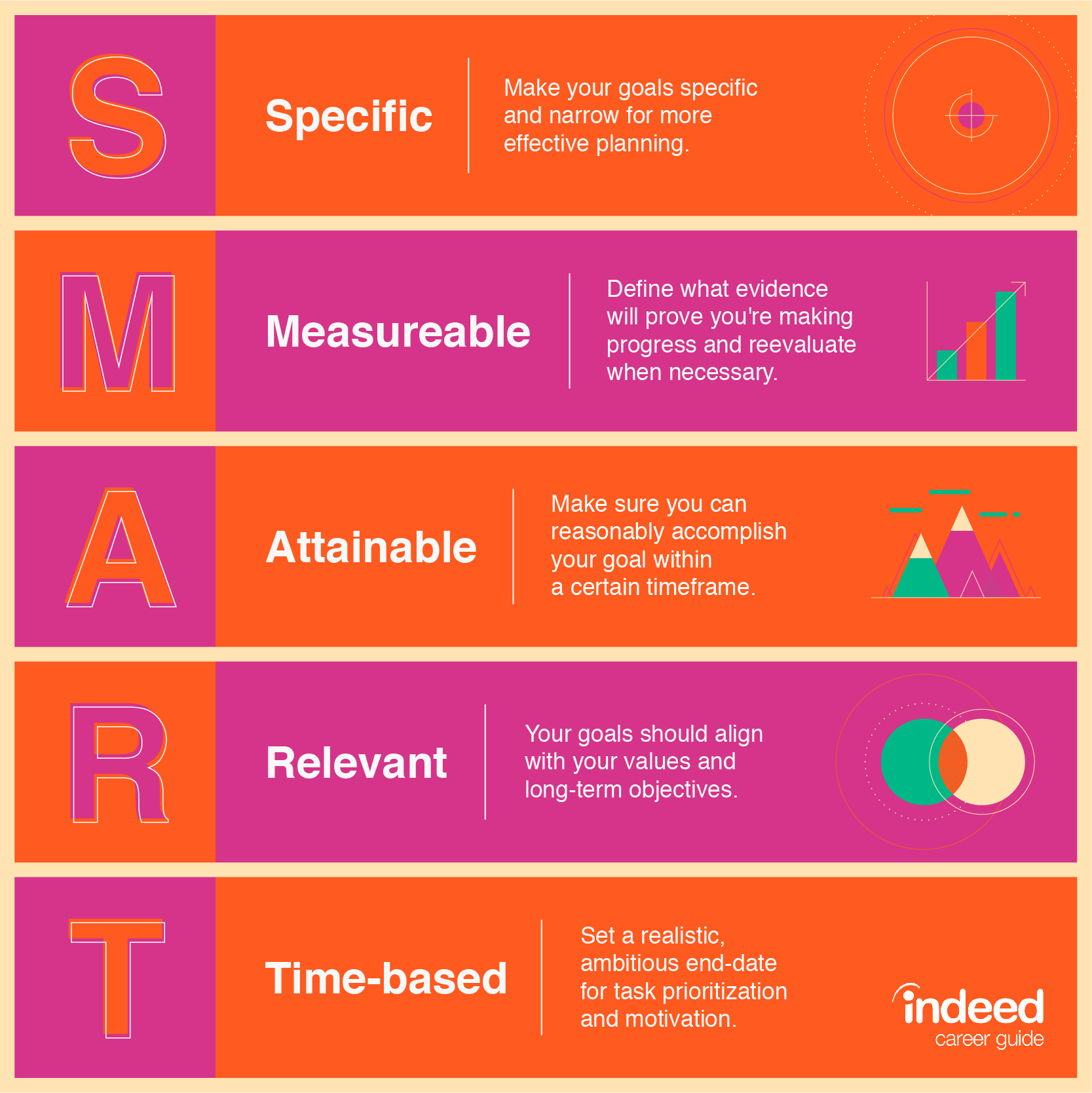How To Achieve Your Workplace Goals
Creating goals in the workplace can help you achieve personal and professional success. They can provide motivation for improving skill sets, learning new skills or growing your responsibilities. Setting timelines and taking steps to achieve your workplace goals can help you excel in your role and advance your career.
In this article, we explain the importance of workplace goals and how to achieve them.
What is the importance of setting goals in the workplace?
Setting goals is important because it helps you define how you should move toward achieving professional short- and long-term objectives both for your personal career and your company. Setting and achieving workplace goals can also show management that you are committed to the success of the organization. Some benefits of setting workplace goals are:
- They give you direction. A well-planned goal helps you move forward in the direction you need or want to go. For example, if you want to become a sales manager someday, writing down that goal with specifics on what steps you will take to achieve it can help you to begin working on your goal right away.
- They help you stay on track. A specific goal gives you a solid plan for accomplishing a task or project. You can look often at your goal to help you stay motivated. For example, if you need to write a training guide for new employees, you can look at the timeline needed to reach that goal on a daily or weekly basis. This reminder can help you meet your deadline.
- They make large projects easier. You can divide your goals into smaller tasks so you do not become overwhelmed with a large project. For example, writing an entire training guide might seem daunting. However, if you set a goal to write one section of the guide each day or week, you will see progress on the task and feel a sense of accomplishment.
- They help with time management. When you have a deadline for a task, setting specific goals for each phase of the project will help you finish the task on time and eliminate distractions.
Related: How to write PROFESSIONAL Development Plan with Example
How to achieve goals
Use these steps to help you set and achieve workplace goals to advance your career or succeed in your role:
1. Create goals that inspire you
When setting workplace goals, choose ones that will motivate you. Think of tasks or accomplishments that will advance your career or relate to your core values. Your desire to accomplish these goals will help you remain inspired and work toward achieving them.
2. Write down your goals
Writing out your goals can reinforce them and provide a visual reminder to work toward them. Consider writing them in a place that allows you to access and view them often, such as on paper, a calendar or a goal tracking application. Assigning a timeline to each goal will allow you to see when their due dates are approaching.
Related: Does Advanced Education Make You a Better Nurse? – 9ja (Naija) Nurses
3. Use SMART goals
SMART goals are a methodology for setting goals that makes them easier to track and accomplish. Using this method gives you clear directions on how to define and plan to achieve your goals. Here are the components of a SMART goal:
- Specific:. Write your goals in a well-defined and clear manner so that you or anyone else in the workplace can understand them. Always use precise action words. For example, “Increase sales” or “Earn a promotion” are unspecific goals, but “Increase sales by 10% this month” or “Become assistant manager by the end of the year” are specific goals, and their clarity makes them easier to work toward.
- Measurable: Use numbers, dates and other objective criteria when setting your goals so you can measure and view your progress.
- Achievable: When you set a goal, check that it is feasible. Look at how much time you have each day, week or month to accomplish a task and set a realistic plan for accomplishing it. Be sure you have the training, tools and resources to achieve the goal.
- Relevant: When you are trying to reach goals, especially in the workplace, they should relate to your career and the direction you want to go. Understand your particular skill sets and expertise in the job, and make the goal relevant to them.
- Time-bound: Similarly to the measurable aspect of SMART goals, you should have a clear timeframe for accomplishing every goal. Knowing when a project needs to be completed will help you focus on all the tasks that need to be accomplished to meet the deadline.

Image description
4. Reevaluate your goals periodically
It is important to look at the progress of your goals regularly. Depending on the depth of the plan, you can reevaluate daily, weekly, monthly or biannually. Look at the actions you’ve taken to move forward with your goal, and if they are successful, continue to do those things. If you find that the goal is harder to achieve than you originally planned, make adjustments so you can increase your progress.
CLICK HERE TO JOIN OUR TELEGRAM GROUP
For example, if you have committed to writing five blog posts per week for the company website, and you are finding it difficult to accomplish those numbers, try writing only four posts per week or changing your schedule so you have more time to write. Speak with your team members or management and get approval for the new plan.
5. Find support and encouragement
Surround yourself with people who encourage you to accomplish your goals. Spend time with positive coworkers, friends, family members and others who believe in what you are trying to achieve. A kind and encouraging word can inspire you to keep moving toward the completion of your goal.
6. Visualize your success
One of the reasons you created goals in the first place was because you wanted a change. Stay passionate about the “why” of your goal. Always visualize yourself succeeding, and use your goals to help you be happy and successful in the workplace. One of the best aspects of goal setting is enjoying the results at the end of successful achievement.
7. Reward your progress
You can use rewards to help motivate you to complete your goals. Keep positive about the small steps you are making toward the plan, and reward yourself when a time-bound goal is met. Develop a system to celebrate your progress, such as taking a break or having a snack for achieving small goals during the day, or attending an event or taking a vacation after accomplishing larger goals. This way you can maintain the excitement of—and commitment to—achieving any goal you set.




1 Comment
Can you be more specific about the content of your article? After reading it, I still have some doubts. Hope you can help me. https://www.binance.com/lv/register?ref=B4EPR6J0